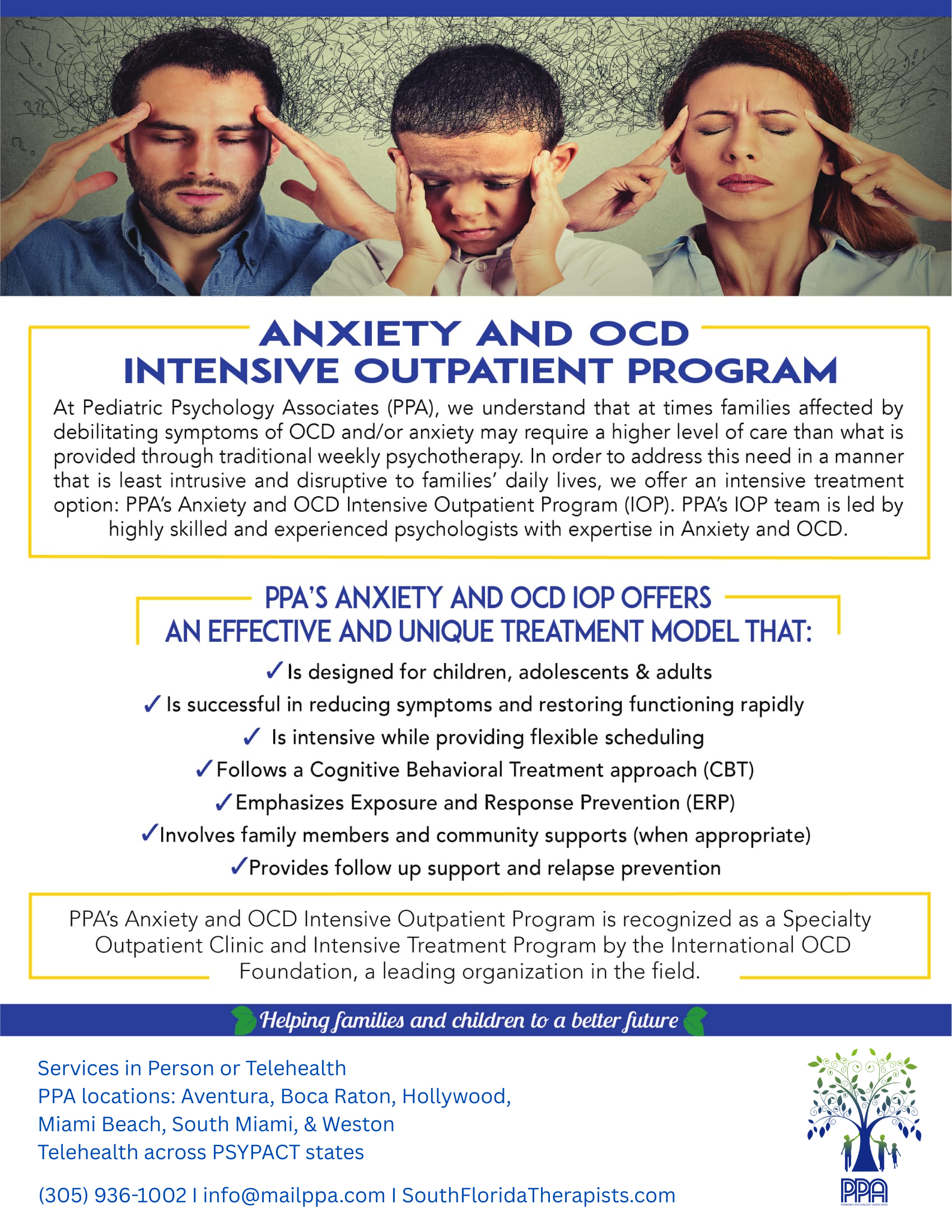Anxiety and OCD IOP
- Home
- /
- Adult Services
- /
- Specialty Services & Programs
- /
- Anxiety and OCD IOP
At PPA, we understand that some adults may require a level of care beyond traditional weekly therapy to effectively manage anxiety or OCD. To address this need, we offer an intensive outpatient program (IOP) that delivers targeted, evidence-based support while minimizing disruption to daily life and professional responsibilities. PPA’s Anxiety and OCD IOP is designed to help individuals achieve faster symptom reduction and improved functioning through structured, goal-oriented treatment. Grounded in cognitive behavioral therapy (CBT) and incorporating exposure and response prevention (ERP), the gold-standard approach for anxiety and OCD. Our program offers the intensity and support needed to make meaningful progress in a shorter period of time.
- High levels of interference in daily life:
The IOP may be appropriate when anxiety or obsessive-compulsive symptoms significantly disrupt routines, such as difficulty attending school, work, or engaging in typical daily activities. - Limited response to traditional therapy:
The program is recommended for individuals who have tried standard outpatient therapy (e.g., weekly sessions) with limited progress or effectiveness. - Need for increased treatment intensity:
The IOP provides a more structured and frequent intervention to address severe symptoms that require concentrated support.
- Obsessive-Compulsive Disorder (OCD)
- Specific Phobias (e.g., fear of vomit/vomiting, heights, school-related phobias, etc.)
- Separation Anxiety
- Panic Disorder
- Agoraphobia
Intensive treatment typically entails meeting with a clinician several times a week. The schedule and frequency of sessions will depend on the results of the assessment and recommended treatment plan. Sessions for IOP will range between 3 to 10 units per week . Sessions units are 45 minutes; the number of units, appointment times, and days will be scheduled depending on the timeframe permitted and presenting circumstances.Treatment will primarily take place in the office and/or telehealth; however, treatment may also take place in other environments.
During the first few days of an intensive treatment, the focus will be on providing psycho-education about anxiety and its treatment. Patients will gain an understanding of the nature and causes of anxiety, and most importantly – they will learn about the factors that maintain their anxiety. This information is an important foundation to begin the journey toward beating anxiety. Patients will also learn to use cognitive strategies to begin to question and change faulty, anxious thoughts. In addition, patients will be taught adaptive coping skills (e.g., mindfulness, relaxation techniques) to help them learn to manage distress without relying on maladaptive behaviors, such as avoidance.
The clinician and patient will then proceed to the most critical component of treatment: exposures. During exposures, patients learn to gradually face feared stimuli and situations in a supportive and empowering environment. Importantly, patients will be coached to resist the temptation to engage in avoidance behaviors and/or compulsive rituals during exposures. With repeated exposures, patients gradually learn to face the previously feared situations more comfortably, without engaging in avoidance behaviors and/or rituals and compulsions. Intensive treatment can be stressful at times, but in both our clinical experience and the scientific literature, it has been shown to be an effective treatment for youth and adults with severe anxiety disorders. To help provide a buffer against treatment and other-related stress, it is important that patients and families engage in adequate self-care (e.g., carve out time to relax and unwind). Your clinician will work with you to develop a plan to engage in appropriate self-care throughout treatment.
If you believe you or a loved one might benefit from this type of intensive treatment, please contact our office so that we can schedule a diagnostic assessment that will help us determine the appropriate level of treatment. You can contact us via phone (305) 936-1002 or email: info@mailppa.com.


